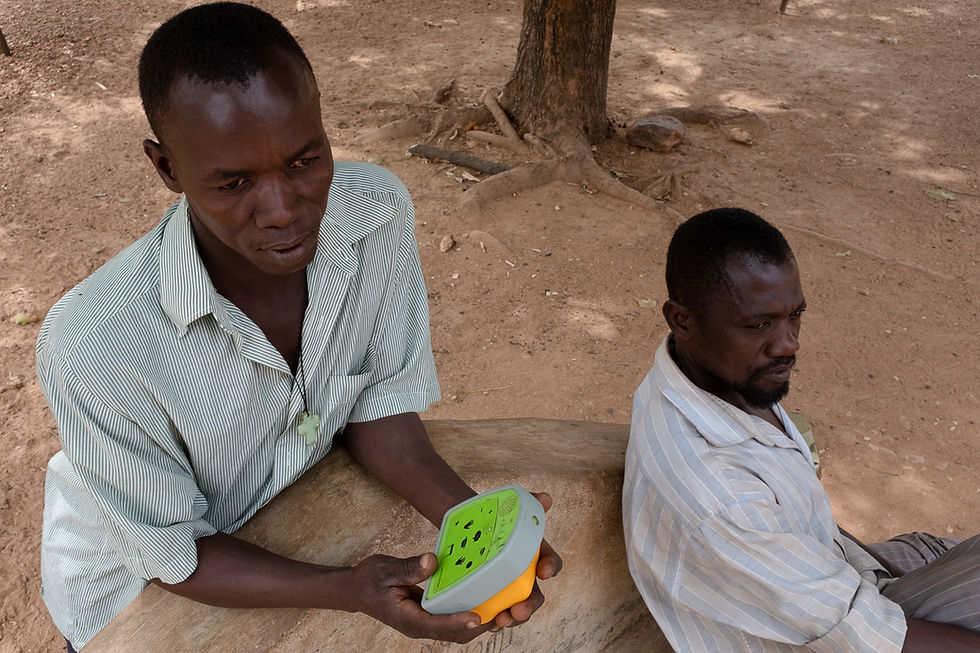Increasing Men's Involvement in Maternal and Child Health
- Amplio
- Dec 12, 2019
- 4 min read
Updated: Jun 16, 2023

In Ghana, Amplio's technology is helping to improve health education quality and outreach in rural districts. Community health nurses have also observed a significant increase in men's awareness and engagement about their important role in maternal and child health.
Amplio has partnered with UNICEF Ghana on social and behavior change (SBC) initiatives in the Upper West and Northern regions since 2013. In 2019, we partnered with UNICEF and Ghana Health Service to pilot the use of Amplio Talking Books with Community-Based Health Planning and Services (CHPS) zones in Jirapa District. Talking Books were introduced at community health facilities in five CHPS zones to enhance health education and service delivery during antenatal care and child welfare clinic sessions. CHPS nurses, midwives, volunteers, and staff used Talking Books to play messages in group listening sessions as well as one-on-one.
Amplio Ghana produced the audio content for the pilot, including songs, dramas, and interviews. Messages are recorded in local languages. Topics include maternal, newborn, and child health, birth registration, kindergarten enrollment, child protection, water, sanitation, and hygiene (WASH), and more.
The innovative use of technology helps to educate and entertain families while they are waiting to be seen. With Talking Books, community health workers can deliver consistent and accurate messages more efficiently and effectively in a community's local language. CHPS zones also have seen a significant increase in men's participation—with more men bringing their families for health services and staying to listen to Talking Books.

Why men's involvement matters
While Ghana has made progress in reducing maternal and child mortality, there’s still more work to do. According to UNICEF, about 70 babies lose their lives every day. This is mainly due to premature birth, infections, and complications during and after delivery.
To improve maternal and child health outcomes, families need better access to quality health education and services—and that's where dads can make a difference. In rural communities, men often control the household finances and decision-making. So, without the involvement of the father, pregnant women may not be able to attend antenatal care visits or act on the health information they’ve received.
UNICEF considers male involvement in pregnancy and child care a key practice for
raising happy and healthy families. This includes ensuring that fathers are involved in the process of offering care to women during pregnancy, childbirth, and after birth. Men's involvement can help improve child survival, growth. and development.

How the CHPS Talking Book pilot improved community health education quality and outreach in rural districts
The UNICEF/CHPS Talking Book pilot, which launched in February 2019, has been implemented in five zones: Sigri, Gbari, Die, Ul-kpon, and Doggo/Konzokala. Each zone has three outreach centers, covering a total of 15 communities.
Community health nurses, midwives, and volunteers played Talking Book messages in group listening sessions followed by discussion. With the Talking Book's built-in speaker, families and groups of up to about 20 people can listen and learn together. For larger groups, an external speaker can be attached. The Talking Books provided "edutainment" while families waited to be seen. Nurses also used the devices when consulting with their patients. Many nurses do not speak the local language of the district where they're working, so the Talking Books helped support communication.
The project actively tries to engage men—not only to educate fathers on the importance of maternal and child health issues, but also to encourage dialogue between couples when it comes to making important health decisions. And it seems to be working. The project saw a significant increase in men's attendance in ANC visits and child welfare clinics from July to September 2019 compared to the same period in 2018.

Involving fathers yields positive results
Participation in Talking Book listening sessions has made men more aware of the importance of being involved in the health of their wives and children. Toffic Dapilaah, Monitoring and Evaluation Officer, Amplio Ghana, said that the team hopes to use this trend to spur greater engagement from men. To do so, they’re sharing success stories at Talking Book listening and discussion sessions. “We try to take advantage of every community meeting to highlight how some men are taking the lead in the regard, to encourage other fathers to do the same,” he said.
So far, the UNICEF/CHPS pilot project has received positive feedback from both male and female community members. Both men and women say that Talking Books provide useful information and entertainment while they're waiting to be seen.

"The Talking Book taught us that we should always accompany our wives for antenatal and child welfare services. Doing that helps me know about maternal and child health. As the family head, I am doing my best to ensure that my family is healthy. Whenever I meet my friends, I encourage them to do the same.”— Mr. Doonyuo Doosaah, a father of five

“I was introduced to a Talking Book listening club for pregnant women when I went to the health center for my first ANC visit. I've learned a lot about good nutrition and folic acid, and why it's important for pregnant women to sleep under a mosquito net. My husband picks me up on his motorbike to go to my health visits. While we're there, he can listen to the Talking Book message. It's become easier to get him to help with some of the things the nurses recommend because he has heard the advice for himself.” — Winifred Domonaangmen
With the increased involvement of men through the Talking Book pilot, families are more firmly committed to health and safety. Many participants have become agents of change in their communities by sharing the knowledge they have learned.